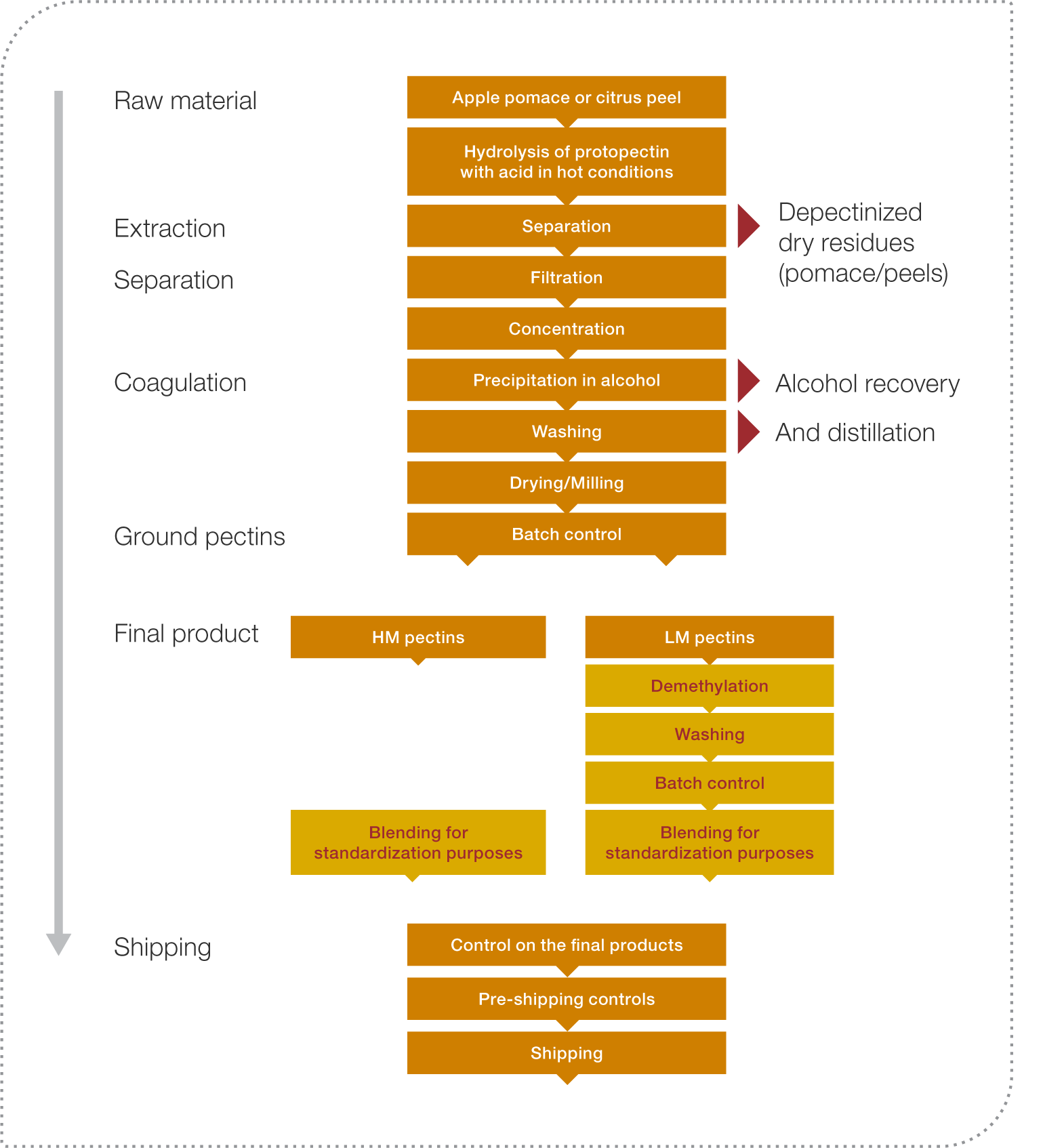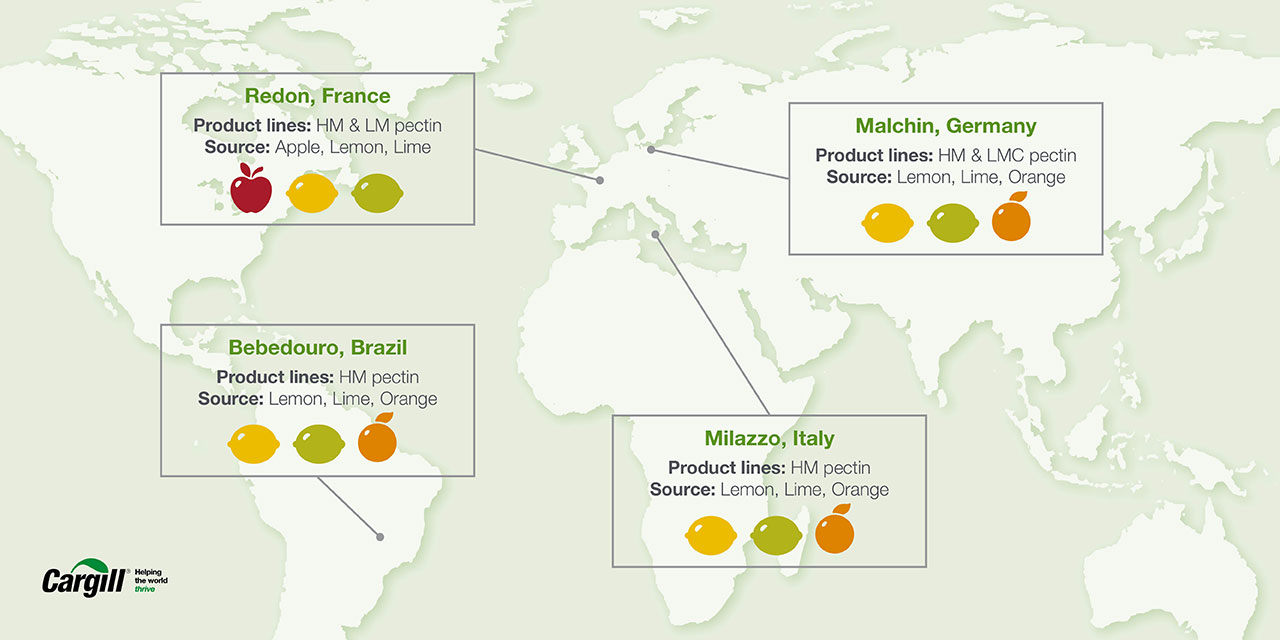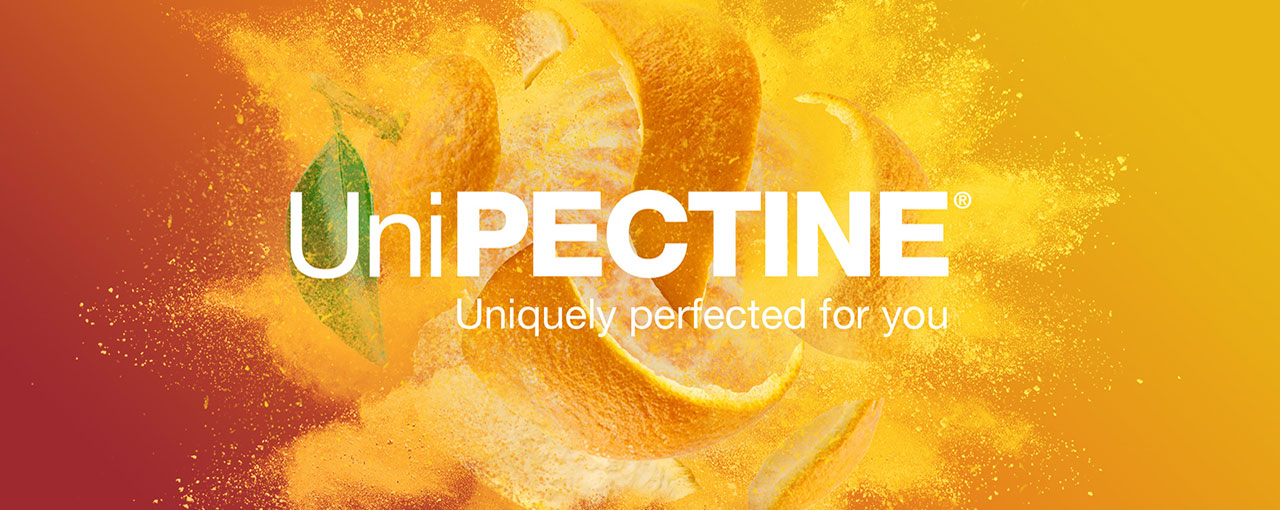Pectin
Cargill's offer - Uniquely perfected for you
Pectin is one of the core ingredients in the Cargill's portfolio: A water-soluble hydrocolloid with gelling and thickening functionalities.
Our passionate teams go above and beyond to ensure our UniPECTINE® solutions are helping to meet your unique formulation and texture needs. We take the time to understand your specific needs in order to provide solutions, not just products. Whether you are looking for specific gelation, setting speed, viscosity, mouthfeel or stabilization, there is a UniPECTINE® solution that has undergone extensive testing and will help to deliver an outstanding consumer product. We offer high-quality nature-derived fruit pectin solutions (HM & LM) in one of the widest pectin ranges commercially available.
Pectin, a versatile ingredient for innovative textures
Pectin is an ingredient and a natural component of plants. Pectin occurs in many fruits but is especially abundant in apples and citrus fruits. Fruit pectin is associated with cellulose in plant tissues, where it plays a fundamental role in determining their mechanical properties.
Pectin, as a food ingredient, can be used as a gelling agent, thickening agent and stabilizer in food applications.
Applications
Today, commercial pectin is used in diverse applications such as jams, jellies, yogurt, acid dairy drinks, bakery fillings and confectionery. As a nature-derived product, pectin is in high demand: in the food & beverage industry, where new applications are constantly being discovered, and increasingly in pharmaceutical and cosmetics applications.
UniPECTINE® is tested for various applications
More information
Functionality
High methoxyl (HM) pectins are defined as those with a DE equal to or above 50, while low methoxyl (LM) pectins have a DE of less than 50.
LM pectins can be acid or alkali-treated. LM pectins also can be either amidated (LMA) or non-amidated (LMC).
Regulatory status
Pectin is generally regarded as a safe food substance. Its composition and use is regulated under food additive law in the EU, and it is GRAS in the USA. It is also included in the International Codex Alimentarius. Particular references include:
FAO/WHO - Codex Alimentarius
Pectins have been given an Acceptable Daily Intake (ADI) of "not specified" by the FAO/WHO Joint Expert Committee on Food Additives (JECFA), and are listed on that basis in the Codex General Standard for Food Additives.
European Union
In EU, Pectin as E 440 (i) and Amidated Pectin E 440 (ii) have not been given an ADI, as assessed in 2017 by the European Food Safety Authority. The purity criteria for both additives are laid down in EU Commission Regulation (EU)/231/2012. The use of pectin in most food categories comes with a “quantum satis”, but for some foods restrictions may be applicable. Detailed information can be found in Annex II of Commission Regulation (EC)/1333/2008.
Japan
The Ministry of Health, Labour and Welfare recognizes pectin under The Japan's Specifications and Standards for Food Additives. In other countries, food legislative authorities generally recognize pectin as a safe food additive. Where regulated, permitted use levels are generally in accordance with “Good Manufacturing Practice.” We recommend to check the local country regulation before using the product.
Thailand
Pectin is approved as a food additive and permitted to use in many food categories in accordance with Good Manufacturing Practice, except in some products where maximum levels are specified in the notification of the Ministry of Public Health no. 418 (2020). Pectin’s specifications follows the JECFA specification.
Vietnam
Pectin is approved as a food additive and permitted to use in many food categories in accordance with Good Manufacturing Practice, except in some products where maximum level are specified (Circular 24/2019/TT-BYT). Pectin's specification is regulated by National Technical Regulation QCVN 4-21:2011/BYT.
Cargill’s global team of regulatory and food law experts will be glad to provide assistance on regulatory, nutrition-related claims and food law-related issues.
Manufacture
Cargill started its pectin production of HM pectins in 1948 and of LM pectins in 1965.
The manufacturing of pectin in all its varieties requires a high level of production expertise. Raw material seleciton, production processes, formulation know-how and quality management are all key areas of expertise supported by Cargill's research and application centers.

Production sites
Cargill's production facilities are among the most advanced in the world. Highly sophisticated manufacturing processes are used to ensure a fast and flexible response to customers' requirements. Thanks to the recent addition of adding a 4th facility in Brazil to our supply network of existing three plants, Cargill has strengthened its position as a reliable supplier of pectin.
Cargill manufactures pectin at the following locations:

Some Cargill products are only approved for use in certain geographies, end uses, and/or at certain usage levels. It is the customer's responsibility to determine, for a particular geography, that (i) the Cargill product, its use and usage levels, (ii) the customer's product and its use, and (iii) any claims made about the customer's product, all comply with applicable laws and regulations.

